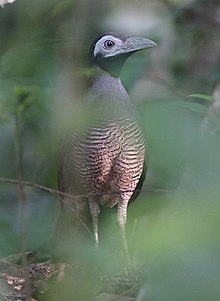Bornean ground cuckoo
| Bornean ground cuckoo | |
|---|---|

| |
| Scientific classification | |
| Domain: | Eukaryota |
| Kingdom: | Animalia |
| Phylum: | Chordata |
| Class: | Aves |
| Order: | Cuculiformes |
| Family: | Cuculidae |
| Genus: | Carpococcyx |
| Species: | C. radiceus
|
| Binomial name | |
| Carpococcyx radiceus (Temminck, 1832)
| |
| Synonyms | |
|
Carpococcyx radiatus (Temminck, 1832) | |
The Bornean ground cuckoo (Carpococcyx radiceus) is a large terrestrial species of cuckoo in the family Cuculidae. It is, as suggested by its common name, endemic to the island of Borneo,[2] being found in the sections belonging to Brunei, Malaysia and Indonesia. It is restricted to humid forest. It is threatened by habitat loss. It was formerly considered conspecific with the Sumatran ground cuckoo.
Taxonomy and systematics[edit]
The Bornean ground cuckoo was described as Calobates radiceus by the Dutch zoologist Coenraad Jacob Temminck in 1832 based on a female specimen from Pontianak district in Borneo.[3] In 1840, George Robert Gray established it as the type species of a new genus, Carpococcyx, because Calobates was similar to the fly genus Calobata.[4] Additionally, it is also a junior homonym of the genus Calobates, established by the German naturalist Johann Jacob Kaup in 1829.[5][6] The specific name, radiceus, is either from the Neo-Latin radius (rod or staff) or radicis (foundation).[7] It is thought to be an error for radiatus or radiosus, with Temminck himself referring to the species by those names in other writings, but the original description does not provide enough evidence to emend the name. Nevertheless, some authorities use radiatus as the specific epithet.[8]
References[edit]
- ^ BirdLife International (2022). "Carpococcyx radiceus". IUCN Red List of Threatened Species. 2022: e.T22684132A207742808. Retrieved 22 July 2022.
- ^ Phillipps, Quentin & Phillipps, Karen (2011). Phillipps' Field Guide to the Birds of Borneo. Oxford, UK: John Beaufoy Publishing. ISBN 978-1-906780-56-2.
- ^ Temminck, Coenraad Jacob; Laugier, Guillaume Michel Jérôme Meiffren (1838). Nouveau recueil de planches coloriées d'oiseaux : pour servir de suite et de complément aux planches enluminées de Buffon [New collection of colored plates of birds: to serve as a continuation and complement to the illuminated plates of Buffon] (in French). Vol. 3. Strasbourg. pp. Plate 538. doi:10.5962/bhl.title.51468. OCLC 23411407.
- ^ Gray, George Robert (1840). A list of the genera of birds : with their synonyma an indication of the typical species of each genus. London: Richard and John E. Taylor. p. 56. doi:10.5962/bhl.title.13777. OCLC 16513435.
- ^ Peters, James Lee (1931). Check-list of birds of the world. Vol. 4. Cambridge: Harvard University Press. p. 64. doi:10.5962/bhl.title.14581. OCLC 12228458.
- ^ Kaup, Johann Jakob (1829). Skizzirte Entwickelungs-Geschichte und natürliches System der europäischen Thierwelt : Erster Theil welcher die Vogelsäugethiere und Vögel nebst Andeutung der Entstehung der letzteren aus Amphibien enthält [Outlined history of development and natural system of the European animal world : First part containing the avian mammals and birds together with an indication of the origin of the latter from amphibians] (in German). Darmstadt and Leipzig. p. 33. doi:10.5962/bhl.title.63915. OCLC 12222116.
- ^ Jobling, James A. (2010). Helm Dictionary of Scientific Bird Names. London: Christopher Helm. ISBN 978-1-4081-2501-4. OCLC 1040808348 – via Biodiversity Heritage Library.
- ^ Payne, Robert B. (2020-03-04). Billerman, Shawn M.; Keeney, Brooke K.; Rodewald, Paul G.; Schulenberg, Thomas S. (eds.). "Bornean Ground-Cuckoo (Carpococcyx radiceus)". Birds of the World. Cornell Lab of Ornithology. doi:10.2173/bow.bogcuc1.01. Retrieved 2022-05-06.

